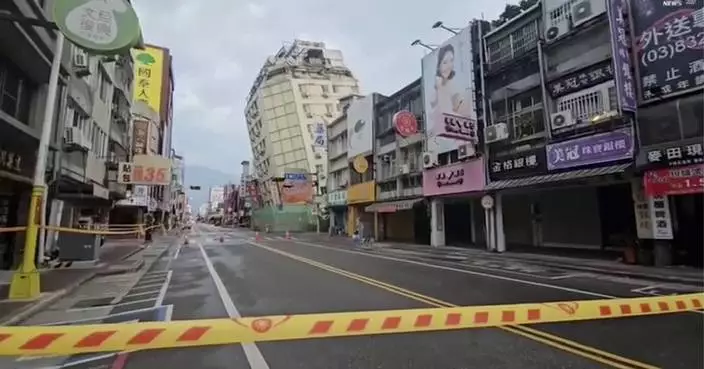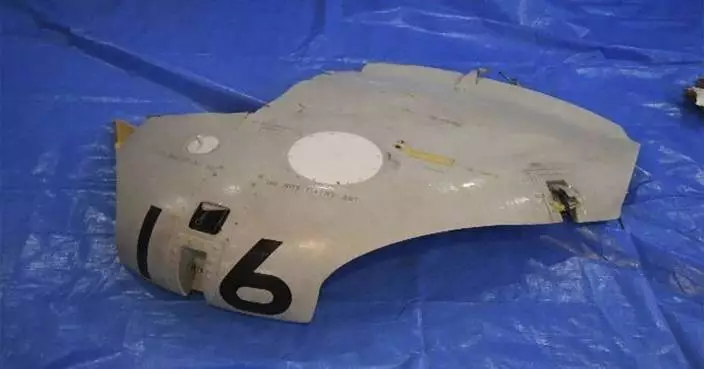The women working at ABC Toys on the second floor of a nondescript office building in Mexico City's working-class Obrera neighborhood drew so little attention to themselves that when the building collapsed in last week's powerful quake few living nearby could recall them.

In this March 2016 photo provided by Mercedes de la Fuente, Amy Huang, left, is pictured with friends at a hot air balloon festival in Teotihuacan, Mexico. Huang was originally from Taiwan and among the immigrants killed during the recent 7.1 magnitude earthquake. (Mercedes de la Fuente via AP)
In death, they remained nearly as anonymous: Government officials identified them in a list of foreigners killed during the 7.1-magnitude quake as simply "four Taiwanese women."
Click to Gallery
The women working at ABC Toys on the second floor of a nondescript office building in Mexico City's working-class Obrera neighborhood drew so little attention to themselves that when the building collapsed in last week's powerful quake few living nearby could recall them.
In death, they remained nearly as anonymous: Government officials identified them in a list of foreigners killed during the 7.1-magnitude quake as simply "four Taiwanese women."
"He loved it here," Moises Lin, Pepe Lin's younger brother, said. "He found an opportunity to come so he took the chance."
Helen Chin left Taiwan with her husband and three children a decade ago. Her daughter, Amy Huang, worked with her at ABC Toys, a family business.
Born Lin Chia Ching, he took the name Jose in Paraguay.
The Lin family boarded a flight from Paraguay and arrived in Mexico City the next day. Even when he saw the mass of rubble that used to be 168 Bolivar Street, Moises Lin could not believe that his brother might be dead.
But Helen Chin, Amy Huang, Carolina Wang and Gina Lai did have names — and stories that came to a sudden end under the rubble of the building at 168 Bolivar Street.
The glass-and-concrete building housing an assortment of Taiwanese toy and technology businesses, along with a clothing company run by an Argentine-born Jewish immigrant, is where nearly all the foreigners killed in the quake died. Aside from the four Taiwanese women, they include Jaime Askenazi, whose friends affectionately called "Che," and Pepe Lin, a Taiwanese-born father of two who made his way to Mexico after first moving as a young boy from Paraguay.
"He came here, like many people," Margarita Cohen, a distant relative said of Askenazi's arrival from Argentina. "To search for more luck."
Their numbers were small but collectively their lives provide a snapshot into recent migration to Mexico. As trade ties between China, Taiwan and Mexico have tightened a new wave of immigrants has arrived to invest in factories and open import-export businesses. Larger numbers arrive from other Latin American nations, either hoping to make their way to the United States or improve their economic prospects in Mexico.
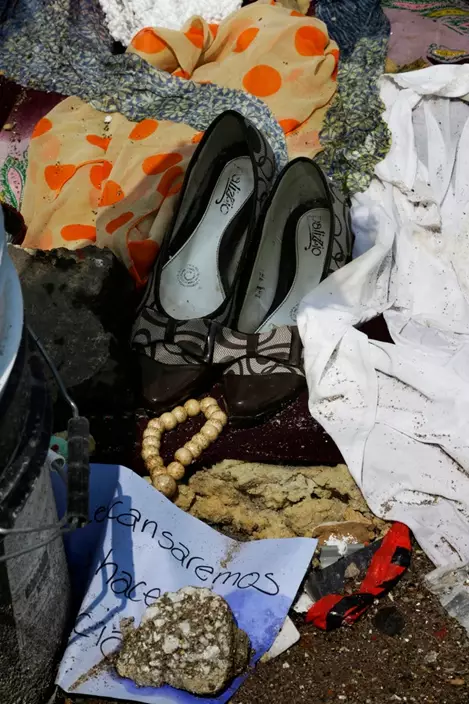
Mementos sit at a memorial where a building collapsed in last week's 7.1 magnitude earthquake in Mexico City, in the Obrera neighborhood of Mexico City, Wednesday, Sept. 27, 2017. (AP Photo/Marco Ugarte)
"He loved it here," Moises Lin, Pepe Lin's younger brother, said. "He found an opportunity to come so he took the chance."
The businesses at 168 Bolivar Street were located on four floors of offices inside the peeling red-painted concrete building with tinted floor-to-ceiling windows. Each business had no more than a half-dozen employees and there were likely no more than 50 people believed to be inside the building when the quake struck.
ABC Toys had a showroom and administrative office in the building, while Lin ran Dashcam System Mexico, a company providing security cameras for vehicles, from the fourth floor. On the same level Diesel Technic, a German-based auto parts company, operated an exhibition space.
Though the building appeared dated and ill-maintained, Moises Lin and other friends and relatives of those who worked there couldn't recall them ever complaining about feeling unsafe.
Rather, they saw the modest office in a neighborhood filled with warehouses and convenience stores as a beacon of opportunity.
Carlos Liao, the head of the Economic and Cultural Office of Taipei in Mexico, said the four Taiwanese women included a recent university graduate, a mother of a 3-year-old girl, and a mother and daughter who worked together. Interviews with friends and relatives provided more details about who they were.
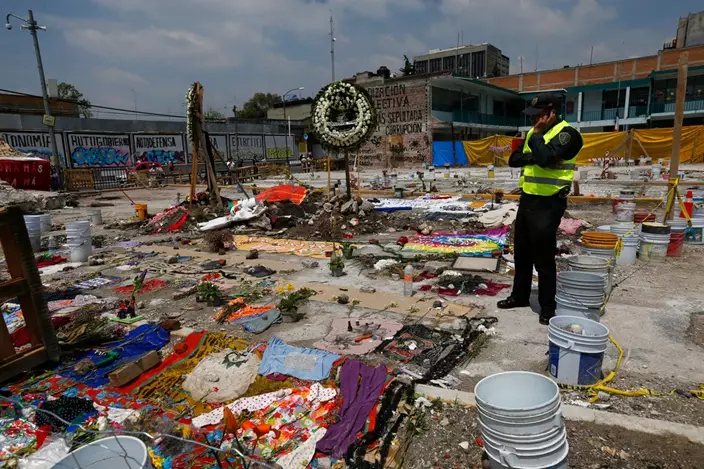
A policeman stands over mementos and flowers at a memorial where a building collapsed in last week's 7.1 magnitude earthquake in Mexico City, in the Obrera neighborhood of Mexico City, Wednesday, Sept. 27, 2017. (AP Photo/Marco Ugarte)
Helen Chin left Taiwan with her husband and three children a decade ago. Her daughter, Amy Huang, worked with her at ABC Toys, a family business.
Chin did not speak Spanish, but her daughter seemed to adapt quickly to the family's new home. She picked up the language and had a tight-knit group of Mexican friends that she traveled with. Photos from their journeys showed Huang smiling during beach outings, a cruise and a birthday party. In one photo, she stands with friends in front of a giant balloon depicting a Mexican mariachi player.
Mercedes de la Fuente, who met Huang through a mutual friend while they were attending the same university, said the 23-year-old was overjoyed when she obtained her Mexican voter ID card, joking with friends in a heavy Asian accent that now she was Mexican.
Recently, she had taken the lead at her family's business after her father was diagnosed with cancer, de la Fuente said. The recent graduate seemed firmly committed to making ABC Toys a success.
"Her plans were with ABC Toys," de la Fuente said.
Lin, who worked two floors above the women, had also worked for ABC Toys at one point, according to his brother. Born in Taiwan, Lin moved with his family to Paraguay when he was a child. There his family ran a Taiwanese restaurant in the capital and Lin helped take care of his little brother.
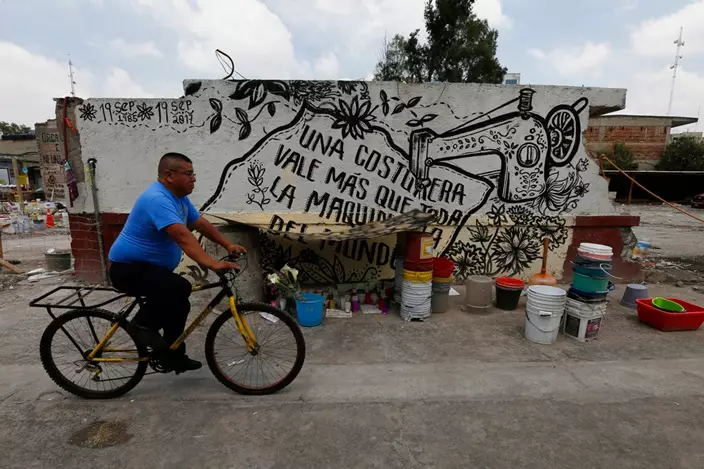
A man rides his bike past the site of a building that collapsed in last week's 7.1 magnitude earthquake in Mexico City, in the Obrera neighborhood of Mexico City, Wednesday, Sept. 27, 2017. (AP Photo/Marco Ugarte)
Born Lin Chia Ching, he took the name Jose in Paraguay.
After moving to Mexico when he was about 30, friends began calling him Pepe, a nickname often used for Jose.
Askenazi had also arrived in Mexico as a young adult pursuing the winds of prosperity.
"Argentina was very bad and Mexico was developing very good," Cohen said.
In Mexico, his family grew to include seven daughters and one son. His clothing business employed a number of people in Mexico City's Jewish community, Cohen said, and as his company flourished he became known for his generosity.
Friends liked to call him Che, a popular word for "pal" in Argentina.
On Sept. 19, all five were at 168 Bolivar Street when the ground began to tremble. Witness video shows the building toppling in a matter of seconds, leaving a gray cloud of dust in its wake.
Word quickly spread in the tight-knit Taiwanese and Jewish communities that some of their own were trapped in the rubble. In Paraguay, Moises Lim called his brother's cell phone repeatedly and got no response. He didn't worry at first, but grew concerned when his sister-in-law called, saying she'd been trying to reach her husband all day and hadn't been able to reach him.
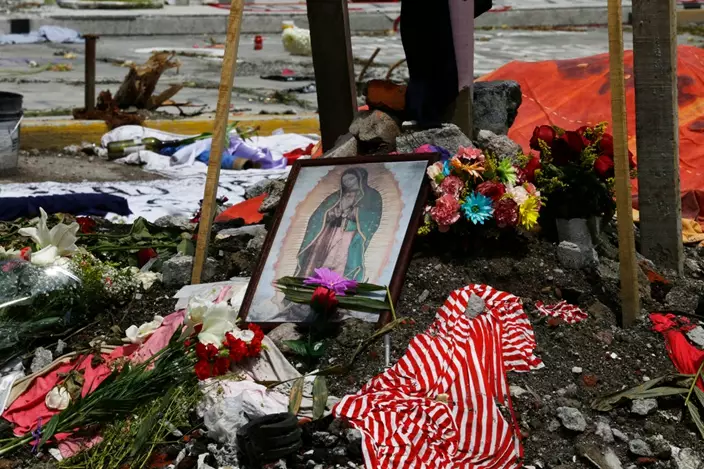
A photo of the Virgin of Guadalupe stands in a memorial at the site of a building that collapsed in last week's 7.1 magnitude earthquake, in the Obrera neighborhood of Mexico City, Wednesday, Sept. 27, 2017. (AP Photo/Marco Ugarte)
The Lin family boarded a flight from Paraguay and arrived in Mexico City the next day. Even when he saw the mass of rubble that used to be 168 Bolivar Street, Moises Lin could not believe that his brother might be dead.
One ambulance came and left with a body from the rubble. Then another. Workers found women's clothes and toys among the debris.
"It can't be Pepe," the distraught family members whispered to one another.
Meanwhile, Huang's and Chin's families and friends launched a massive online effort to try to locate them, spreading photos and pleading for any information.
Late on the day after the quake struck, Moises Lin said the family got an unexpected call from Pepe Lin's cell phone. It wasn't his brother's voice on the line, but rather that of a rescuer. They had found a destroyed phone on a man's body and had managed to recover the SIM card with its phone numbers.
"Can you come and check if it's your brother?" the man asked.
"We went to the morgue," Moises Lin said. "And it was my brother."
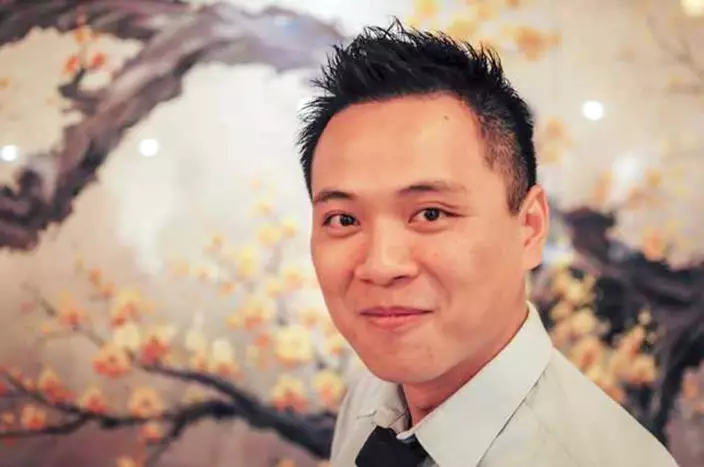
In this 2010 portrait provided by Moises Li, Pepe Lin is pictured at a birthday party. Pepe in was born in Taiwan, raised in Paraguay and moved as an adult to Mexico in pursuit and economic and professional opportunities. He was among the migrants killed in the 7.1-magnitude earthquake. (Moises Lin via AP)
The four Taiwanese women were all pulled from the wreckage lifeless within three days after the quake. Liao, who spent hours at the search site and accompanied the families, said the force of the collapse left the women nearly unrecognizable. One was identified through a birthmark, another by her jewelry. The last was identified with the help of her acupuncturist.
Two Buddhist monks were flown in from Los Angeles for a traditional ceremony that stretched through the weekend and into Monday, the seventh day of their deaths, when Liao said many Taiwanese believe the deceased passes from the world of the living into heaven.
In the days since, Moises Lin said he's wondered about the building where his brother was trying to forge his future. He wonders why the company didn't choose a space that was better maintained. But he considers such questions useless now and is trying not to anguish over them.
"A part of me is frustrated," he said in Spanish, before switching to English. "But I cannot feel that. Because if I feel that my brother won't rest in peace."
All of the women and Pepe Lin were cremated. Relatives recently began the journey of taking their remains home.
VILLA MADERO, Mexico (AP) — As a drought in Mexico drags on, angry subsistence farmers have begun taking direct action on thirsty avocado orchards and berry fields of commercial farms that are drying up streams in the mountains west of Mexico City.
Rivers and even whole lakes are disappearing in the once green and lush state of Michoacan, as the drought combines with a surge in the use of water for the country’s lucrative export crops, led by avocados.
In recent days, subsistence farmers and activists from the Michoacan town of Villa Madero organized teams to go into the mountains and rip out illegal water pumps and breach unlicensed irrigation holding ponds.
A potential conflict looms with avocado growers — who are often sponsored by, or pay protection money to, drug cartels.
Last week, dozens of residents, farmworkers and small-scale farmers from Villa Madero hiked up into the hills to tear out irrigation equipment using mountain springs to water avocado orchards carved out of the pine-covered hills.
The week before, another group went up with picks and shovels and breached the walls of an illegal containment pond that sucked up water from a spring that had supplied local residents for hundreds of years.
“In the last 10 years, the streams, the springs, the rivers have been drying up and the water has been captured, mainly to be used for avocados and berries,” said local activist Julio Santoyo, one of the organizers of the effort. “There are hamlets in the lower part of the township that no longer have water.”
Santoyo estimated that about 850 of the plastic-lined, earthen containment ponds have sprung up in the hills around Villa Madero, usually soon after planters have illegally logged or burned the native pine forest. Pines help the soil retain water, while avocado trees deplete it.
Francisco Gómez Cortés said residents of his hamlet, El Sauz, had been asking the landowner for 15 years to allow the spring to flow downhill to their community.
After a year in which Mexico received only about half its normal rainfall, residents became desperate, and last week they worked up the courage to hike up the hill and rip out pumps and hoses for the avocado orchard.
“We don't have enough water for human consumption,” Gómez Cortés said.
“It’s sad. It’s sad to walk down these trails that are now dry, when they once had trees and springs,” he said. “They haven’t even left any water for the (forest) animals that nest along the banks.”
In a sign of how seriously the local government is taking the potential threat, the group was accompanied by the mayor of Villa Madero, who blamed outsiders for the problem.
“There are people who aren't from this town, who come to our township and are invading us,” Mayor Froylan Alcauter Ibarra said. “They are taking water away from the people who live downhill, and they don't realize these are the poorest people.”
Residents say they don't want to deny water entirely to the orchards and have proposed an agreement to give landowners 20% of the water from local streams, if they allow the remaining 80% to keep flowing. They say they haven't gotten any response yet.
Drug cartels often make money from illegal logging and extorting money from avocado growers in Michoacan. The activists around Villa Madero have suffered threats, kidnappings and beatings in the past.
“We are running a serious risk of them killing us for protesting,” Gómez Cortés said. “Out of necessity, we are doing what the government should be doing.”
The government has long done little to limit the growers and combat deforestation and water takeovers. But it does seem to have developed a sudden interest in preventing the looming conflict.
In March, activists organized a meeting nearby at Patzcuaro Lake to demand authorities do something about the fast-declining water levels. Patzcuaro is a shallow but extensive lake in Michoacan with a beautiful colonial town on its shores and an island of fishermen perched in the middle.
The fishermen of Janitzio island with their shallow boats and hooped, figure-eight nets were made famous by photographers and filmmakers in the 1940s and 50s as a symbol of Mexico's folk traditions. The town of Patzcuaro draws hundreds of thousands of tourists.
But due to the drought, deforestation, sediment buildup and the increased water demands from avocado and berry growers, Patzcuaro lake has been reduced to about half its size. You can now reach the Janitzio island by wading, and activist Juan Manuel Valenzuela estimates that 90% of the boats that used to fish and ferry tourists around are now out of service.
Nearby Lake Cuitzeo, one of the largest freshwater lakes in Mexico, is now nearly dried up.
“We cannot allow them to extinguish our lakes,” Valenzuela said. “It would be a tragedy for Michoacan.”
Alejandro Méndez, Michoacan's state environment secretary, acknowledges that the problem has gotten out of hand. So scarce has water become in the once-lushly forested lake areas that orchard owners often send tanker trucks to suck thousands of gallons from the lake to water their groves.
“As many as 100 trucks could be seen taking water from the lake,” Méndez said of the situation in March.
So about a week ago, the state police began patrolling the lake shore and detaining any truck drivers they saw extracting water. And Méndez said the state has begun monitoring agricultural holding ponds to see if any are getting refilled from the lake.
While Lake Patzcuaro has grown and shrunk in the past, this time it may be terminal; farmers are starting to pasture livestock and plant crops on the lake bed.
“It will be difficult, because the humans and the livestock will survive, barely, but the animals and the plants will be gone — that will all be dried up and gone,” Gómez Cortés said.
AP writer Mark Stevenson in Mexico City contributed to this report.
Follow AP’s coverage of Latin America and the Caribbean at https://apnews.com/hub/latin-america
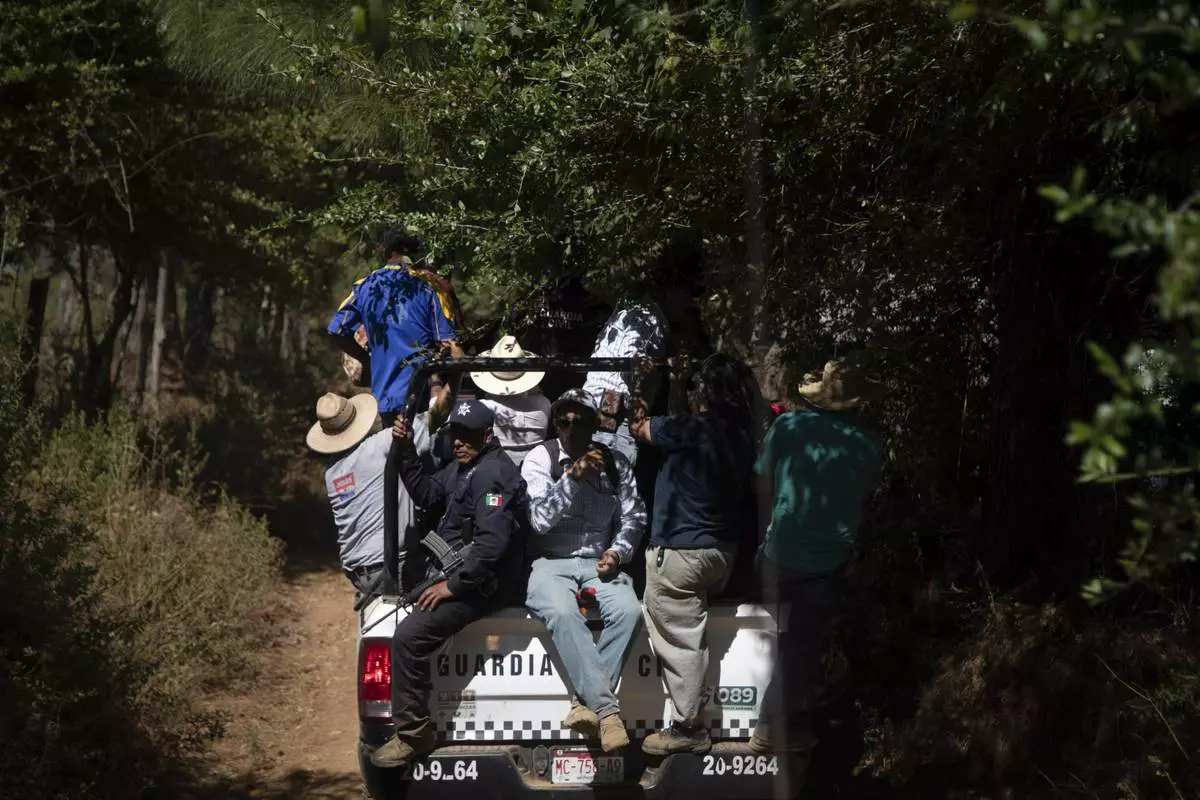
Locals ride in a National Guard truck in search of unlicensed water intakes and irrigation holding ponds that irrigate avocado and berry orchards during a drought in the mountains of Villa Madero, Mexico, Wednesday, April 17, 2024. Subsistence farmers and activists from the Michoacan town of Villa Madero organized teams to go into the mountains and rip out illegal water pumps and breach unlicensed irrigation holding ponds. (AP Photo/Armando Solis)
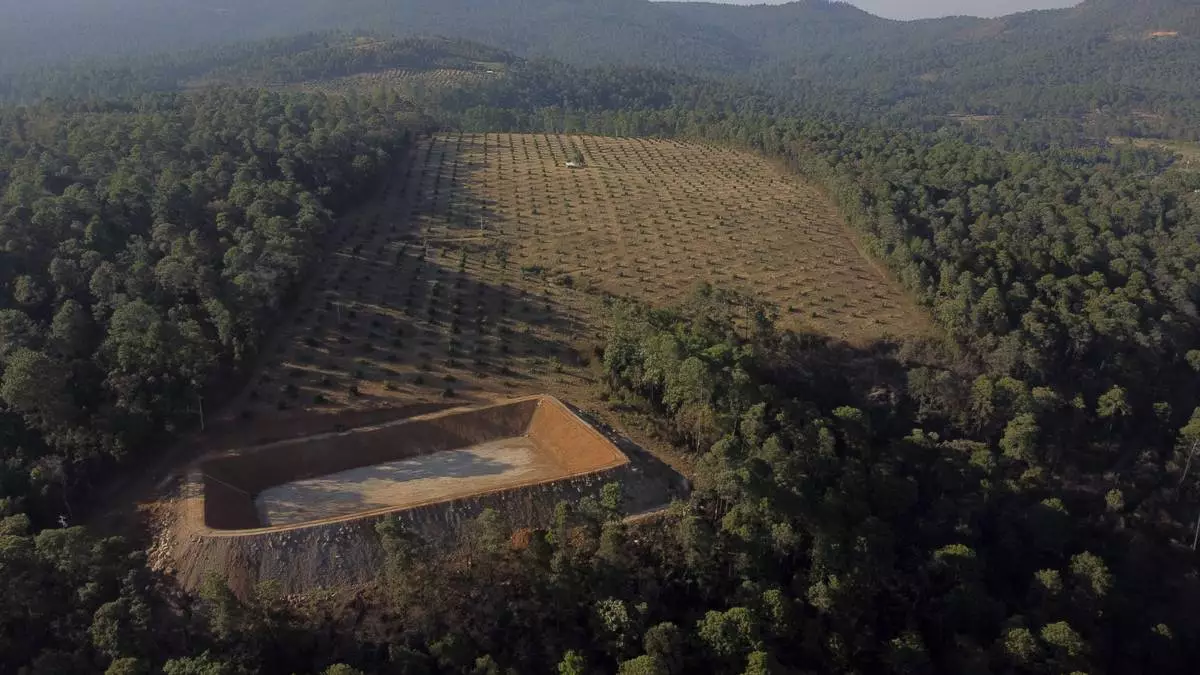
An unlicensed irrigation pond is under construction by an avocado orchard during a drought in the mountains of Villa Madero, Mexico, Wednesday, April 17, 2024. Farmers from Villa Madero who spotted the pond say they plan to meet with authorities to get the pond's owner to agree on a percentage of water usage, and if it fails, they plan to destroy it. (AP Photo/Armando Solis)
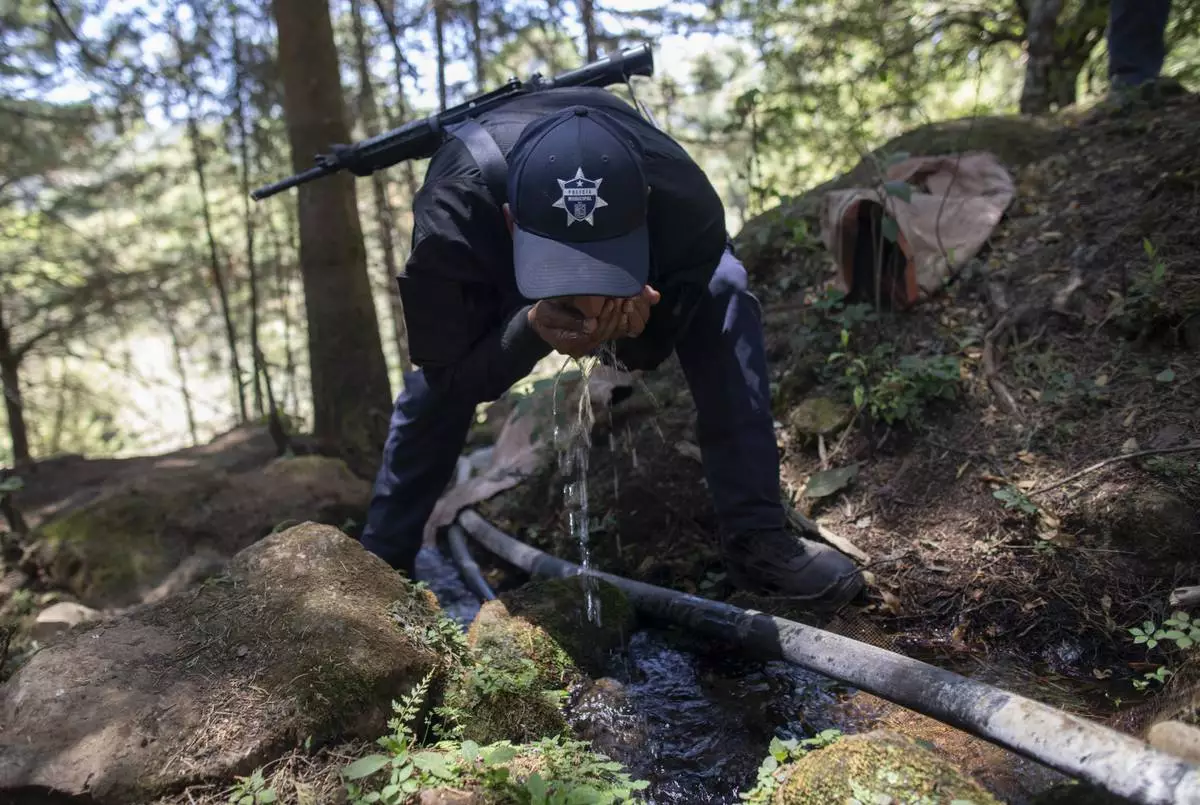
A municipal police officer drinks water from a stream lined with an unlicensed hose as he accompanies locals who are dismantling illegal water taps during a drought in the mountains of Villa Madero, Mexico, Wednesday, April 17, 2024. On Wednesday, dozens of residents, farmworkers and small-scale farmers from Villa Madero hiked up into the hills to tear out irrigation equipment using mountain springs to water avocado orchards carved out of the pine-covered hills. (AP Photo/Armando Solis)
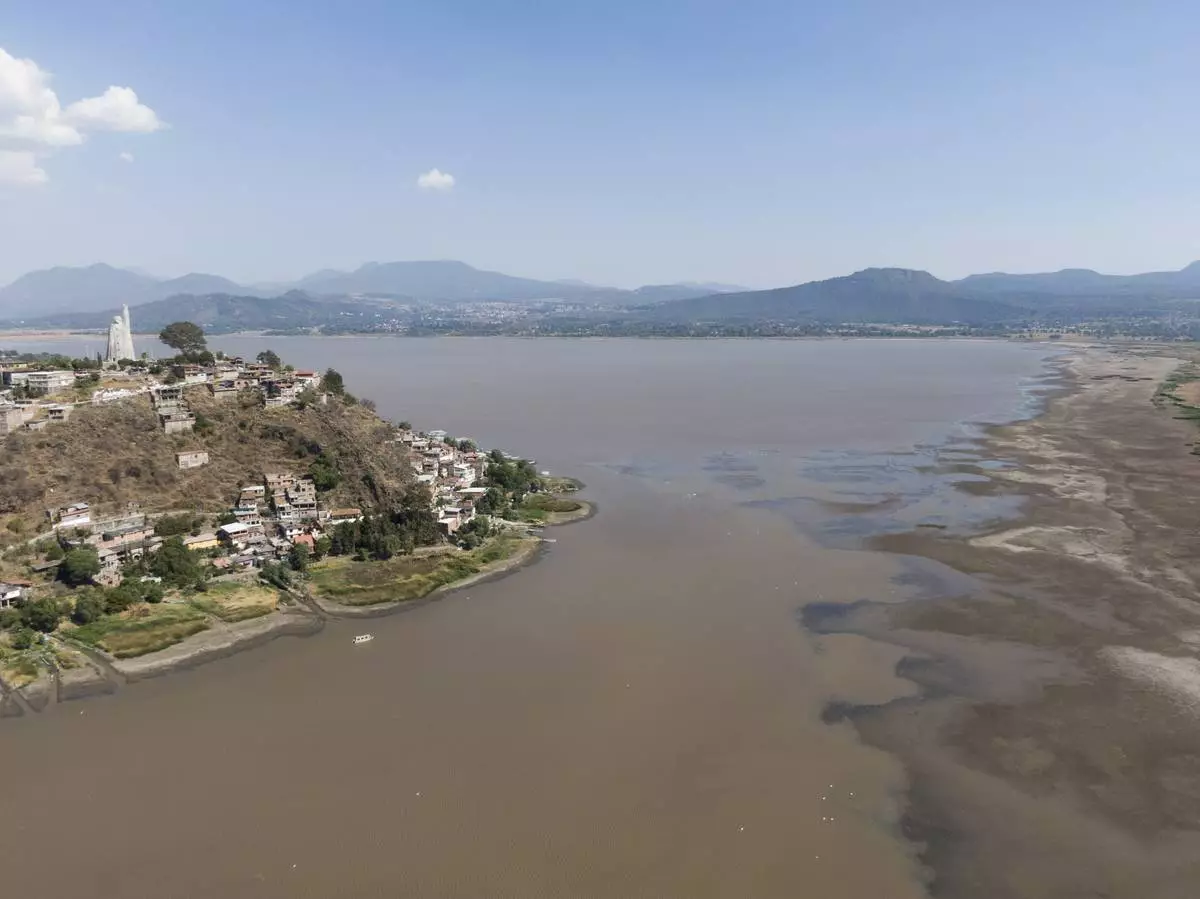
Janitzio Island stands in Lake Patzcuaro, which has low water levels during a drought in Mexico, Thursday, April 18, 2024. Farmers are starting to pasture livestock and plant crops on the lake bed. (AP Photo/Armando Solis)
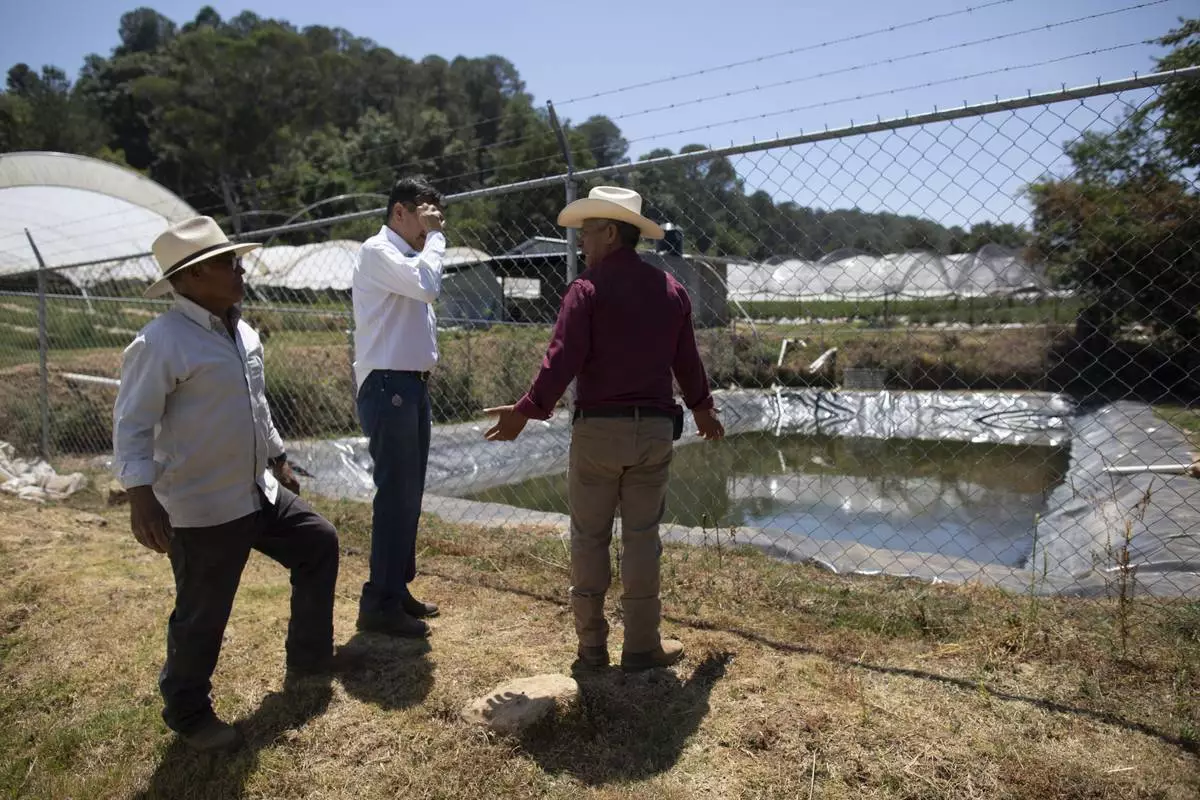
Residents of Villa Madero look at unlicensed irrigation holding ponds during a drought in the mountains of Villa Madero, Mexico, Wednesday, April 17, 2024. The group said they plan to meet with authorities to get the pond's owner to agree on a percentage of water usage, and if it fails, they plan to destroy it. (AP Photo/Armando Solis)
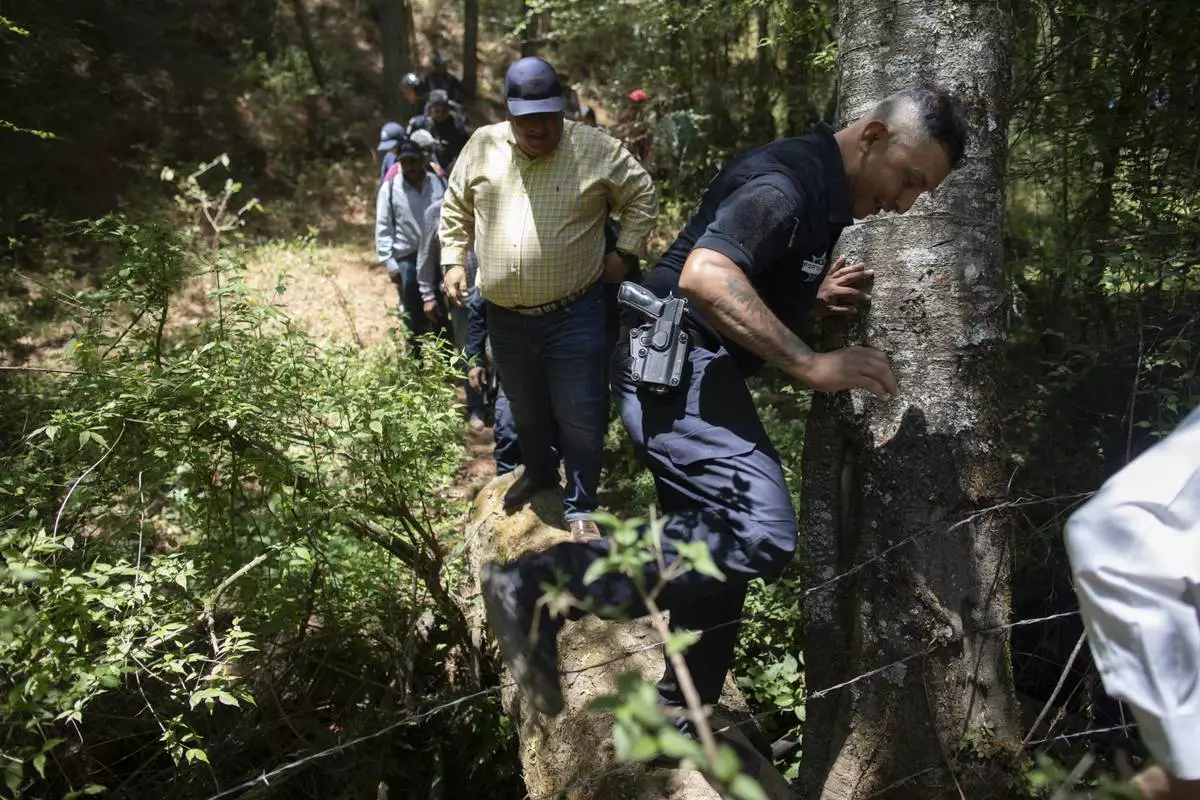
An armed police officer accompanies locals from Villa Madero through the mountains in search of unlicensed water intakes and irrigation ponds during a drought in Villa Madero, Mexico, Wednesday, April 17, 2024. Subsistence farmers and activists from the Michoacan town of Villa Madero organized teams to go into the mountains and rip out illegal water pumps and breach unlicensed irrigation holding ponds. (AP Photo/Armando Solis)
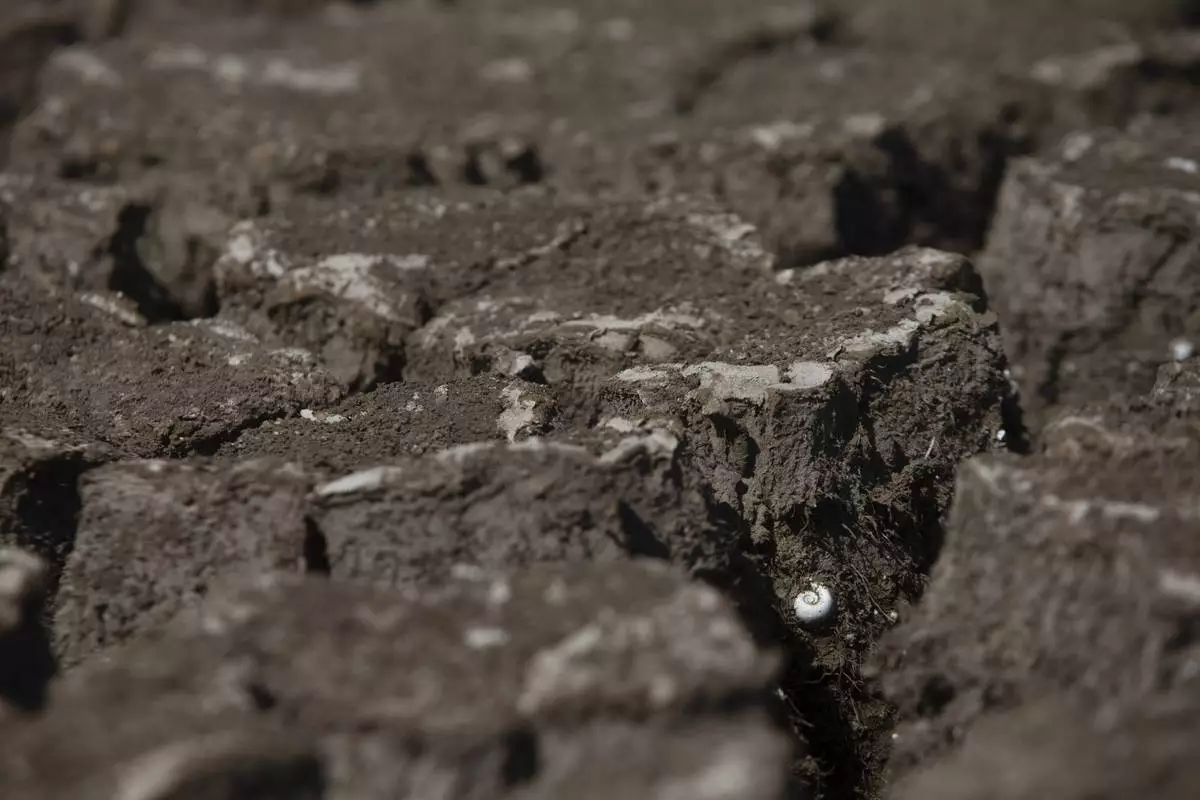
A snail lays in the dry bed of Lake Patzcuaro, during a drought in Mexico, Thursday, April 18, 2024. The lake has been reduced to about half its size, due to drought, deforestation, sediment buildup, and increased water demands from avocado and berry growers. (AP Photo/Armando Solis)

Boats are docked on the shore of Lake Patzcuaro, during a drought in Mexico, Thursday, April 18, 2024. Activist Juan Manuel Valenzuela estimates that 90% of the boats that used to fish and ferry tourists around are now out of service. (AP Photo/Armando Solis)
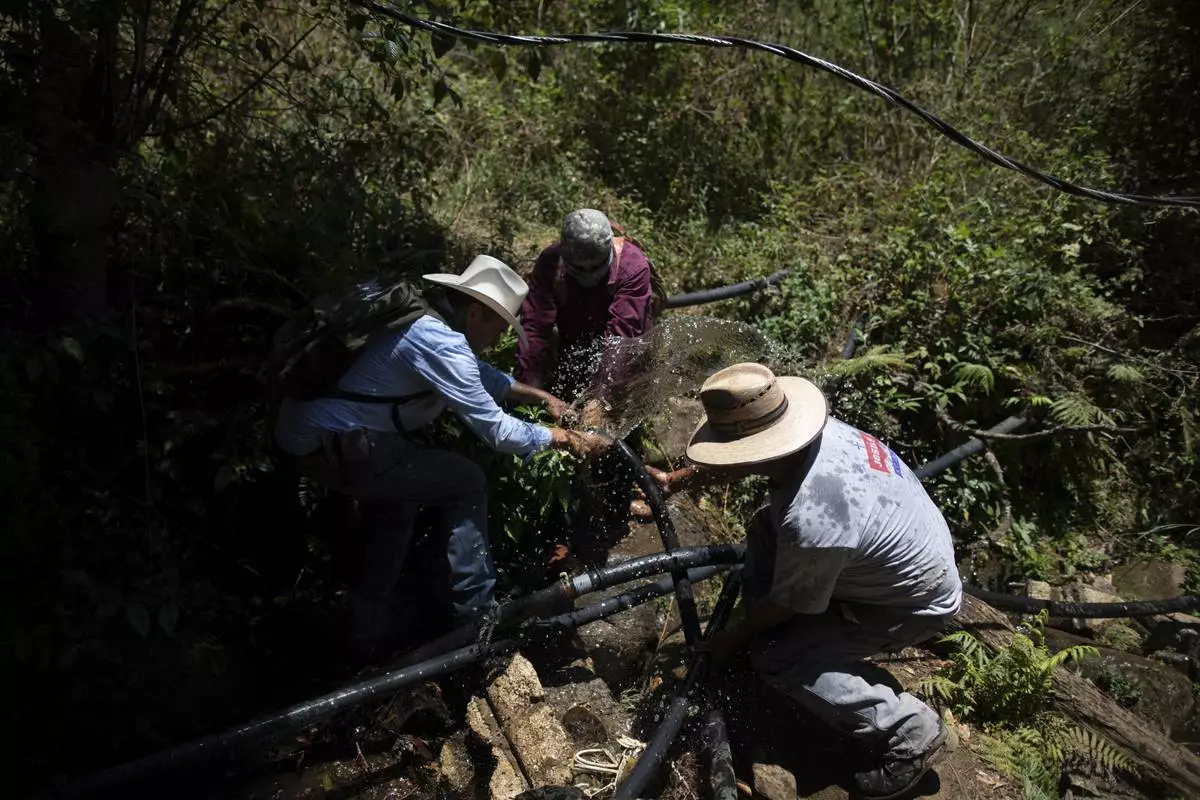
People dismantle an unlicensed water intake as their group of residents, farmworkers and small-scale farmers disconnect water taps in the mountains of Villa Madero, Mexico, Wednesday, April 17, 2024. As Mexico's drought drags on, angry farmers in Villa Madero have begun taking direct action to dismantle illegal water intakes which they say are drying up the streams in the mountains west of Mexico City. (AP Photo/Armando Solis)
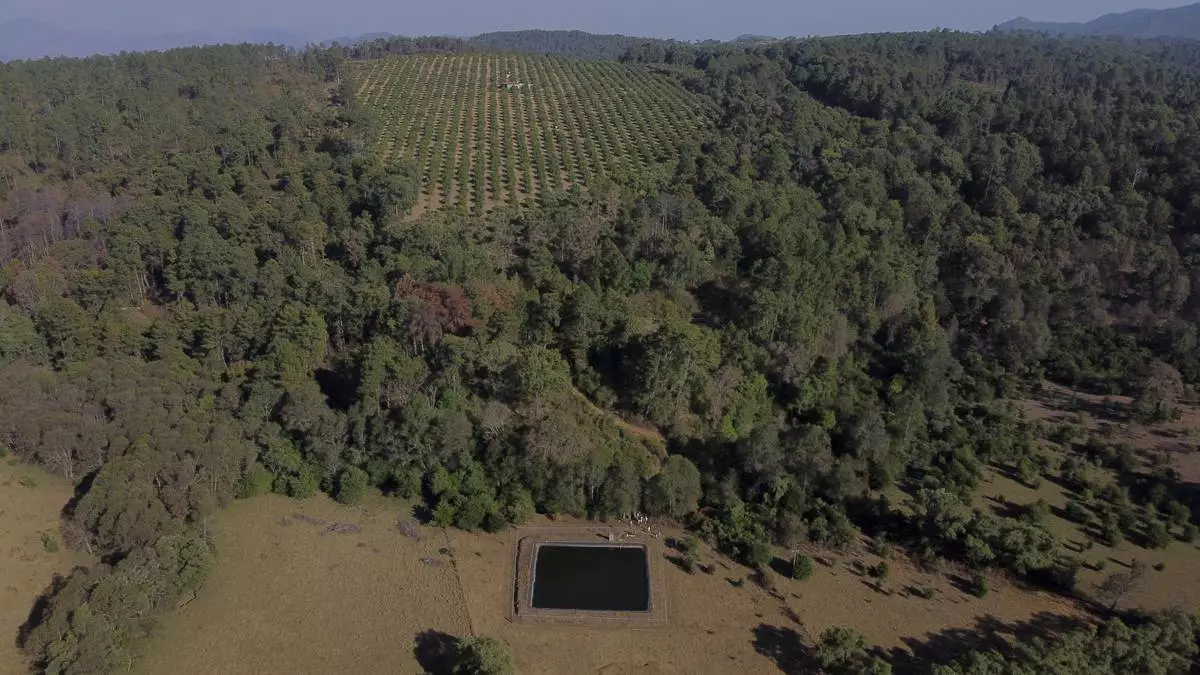
An unlicensed irrigation pond holds water near an avocado orchard in the mountains of Villa Madero during a drought in Mexico, Wednesday, April 17, 2024. Residents from Villa Madero who spotted the pond say they plan to meet with authorities to get the pond's owner to agree on a percentage of water usage, and if it fails, they plan to destroy it. (AP Photo/Armando Solis)
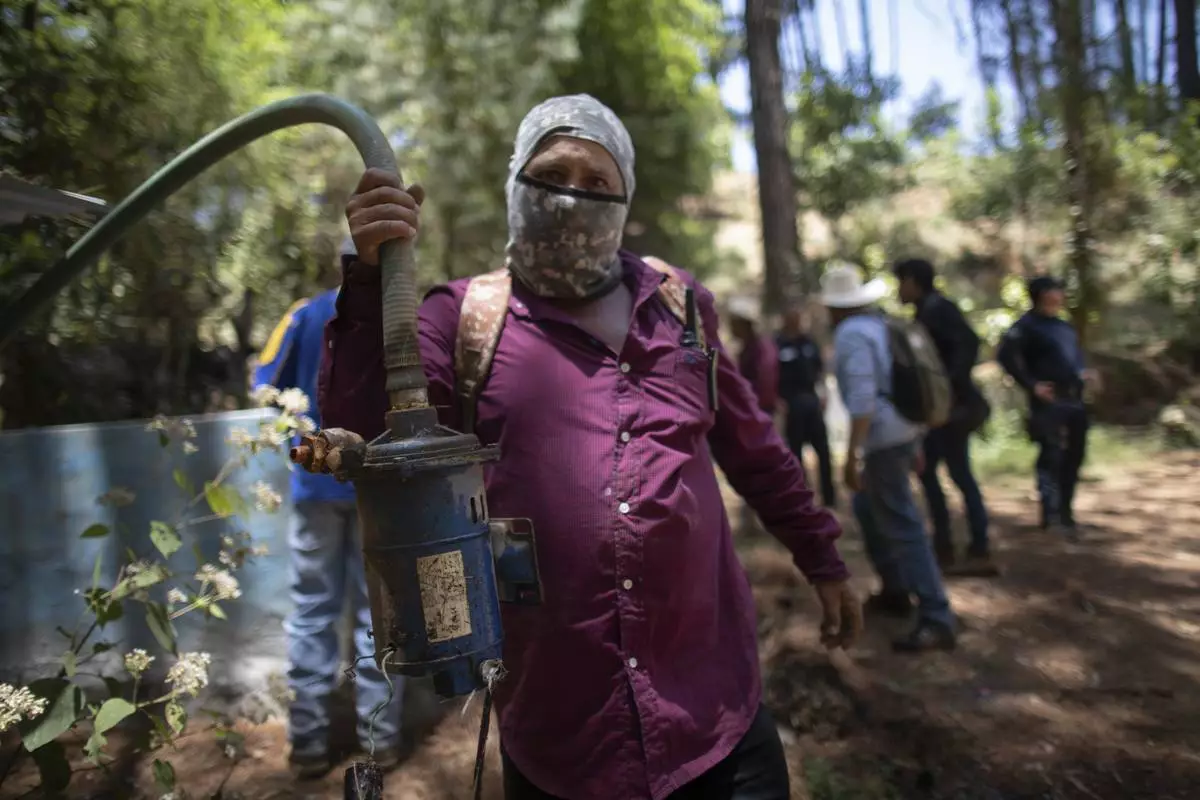
A man shows a pump removed from an unlicensed water intake as his group of residents, farmworkers and small-scale farmers from Villa Madero dismantle illegal water taps in the mountains of Villa Madero, Mexico, Wednesday, April 17, 2024. As a drought in Mexico drags on, angry subsistence farmers have begun taking direct action on thirsty avocado orchards and berry fields of commercial farms that are drying up streams in the mountains west of Mexico City. (AP Photo/Armando Solis)





















